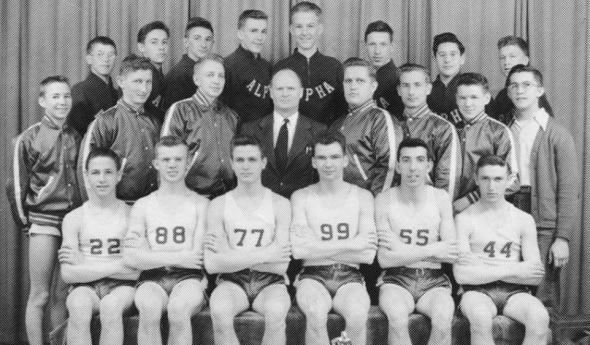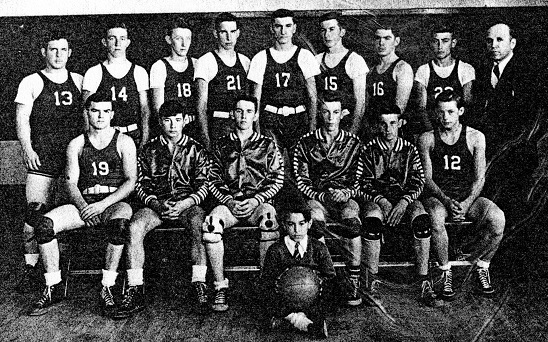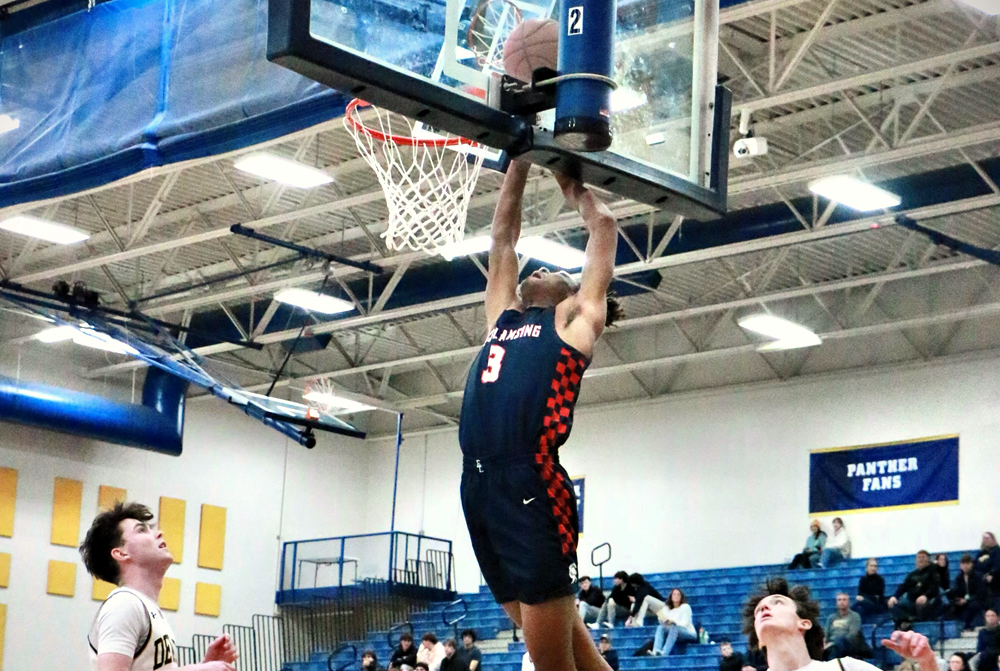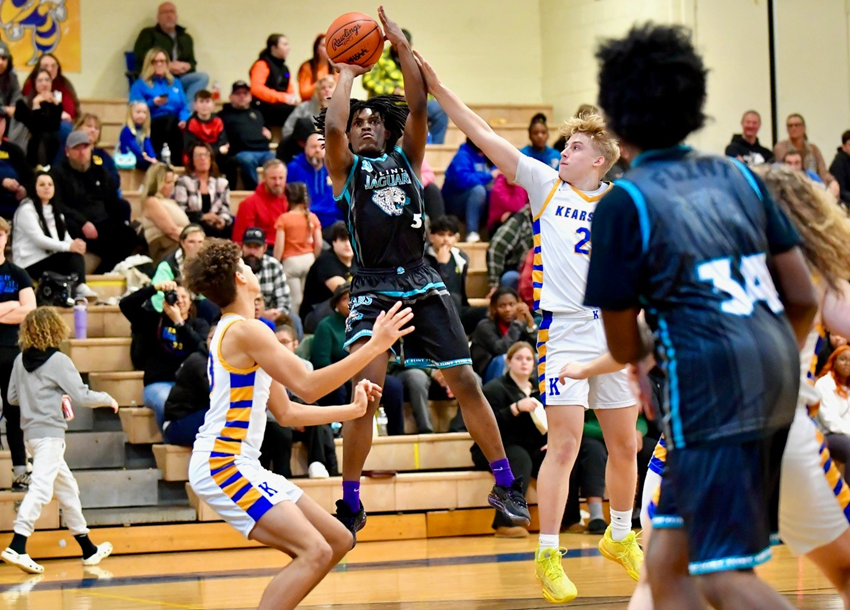
Before the Bridge: Class E & the UP
July 31, 2017
By Ron Pesch
MHSAA historian
This is the final part in a series on MHSAA tournament classification, past and present, that has been published over the last two weeks and originally ran in this spring's edition of MHSAA benchmarks.
The stories are worthy of the silver screen.
Long lost legends of lore, forgotten by most in the Lower Peninsula of the state of Michigan.
Absurd anecdotes of basketball played behind glass, and out-of-bounds lines painted on walls.
Tales of overlooked places like Trenary and Champion and Doelle and Watersmeet.
This is the story of MHSAA Class E basketball.
From 1932 to 1947, Michigan's Upper Peninsula did not compete in the state-sponsored basketball tournament. Instead, the U.P. held a separate basketball tournament, crowning champions in Classes B, C and D. In 1941, the state added a fifth classification – Class E, comprised of schools with a student body numbering 75 or fewer. A fourth bracket was added to the U.P. tourney.
Following the 1948 season, the Upper Peninsula returned to the state tournament. Winners of the traditional U.P. tourney were pronounced regional champions, and advanced to the state quarterfinals in Classes B, C and D. However, since there were no Class E schools with basketball teams in the Lower Peninsula, the winner of the U.P. tournament crown was proclaimed Class E state champion. This arrangement continued through the spring of the 1960 season.
Since they were the state's smallest high schools, the gymnasiums came in all shapes and sizes. Some sported a center circle that intersected with the top of the key. Basketball courts that doubled as a stage required netting to keep the kids and the ball on the court and away from the audience seated below.
Fred Boddy, a former coach at Champion, recalled his first visit to Doelle. Located in copper country near Houghton, the hosts were the proud owners of “the smallest” gym in U.P.
“I couldn't believe my eyes. ... Here on the second floor were windows and bleachers all around filled with fans. The gym, of course, was located on the first floor, but to get into the gym one had to go around to the back of the school to enter through the boiler room to the locker rooms, which opened onto the gym floor much like a dugout on a baseball field. The players sat on a bench under the wall and could look out and see the game in this manner. The free throw lines intersected and there were no out of bounds lines... the wall itself was ‘out of bounds.’ On the floor during the game were 10 players and two referees. There were no sounds as all the fans were up on the second floor, glassed in.
The cheerleaders tried valiantly to fire up the fans up on the second floor, but the teams couldn't hear in the quiet below. The score clock and statistician personnel were placed in a corner box high over the floor in one corner of the gym. They attained this lofty perch by a ladder that was removed from the trap door after all three were in position and the game could thus commence. The timer then tied a rope around his ankle. To send a sub into the game the coach would send the player along the wall heading for this rope. He would pull the rope causing the timer to look down through the trap door and at next opportunity would ring the buzzer and admit this substitute”
Regardless of the challenges presented by these cracker-box gyms, the fans loved their basketball. “The enthusiasm was just the same, if not bigger, than schools twice and 10 times their size,” noted longtime U.P. historian, Jay Soderberg.
Coach Joseph Miheve's 1941 Palmer squad captured the state's first Class E title with a 39-28 win over Hulbert at Ironwood. A graduate of Wakefield High School, Miheve had never played high school basketball, serving as the team's manager.
The 1942 tournament, scheduled for March 19-21, was postponed one week because the city of Marquette was more or less taken over “by nearly 1,000 selective service registrants from every county in the Upper Peninsula” who had another and more serious battle in mind – World War II.
Palmer, this time coached by Elvin Niemi, repeated in Class E with a 37-31 victory over Bergland. It was Palmer's 32nd consecutive victory.
No tournament was held in 1943 due to the involvement of the United States in the war. In the 1944 championship game, Cedarville jumped out to a 19-14 first quarter lead but was held to 24 points in the remaining periods and fell to Amasa, 51-43 at Ishpeming.
Trenary made its lone Class E finals appearance in 1945, losing to Bergland 49-39 at Ishpeming, while the Alpha Mastodons won their first U.P. title since 1934 with a 48-28 win over Champion in 1946. It was the second of five Class E titles for Alpha coach Gerhardt “Gary” Gollakner, one of the finest coaches to come out of the U.P. Gollakner had coached at Amasa two years earlier, and his Mastodons would earn three additional titles during the 19-year run of the Class E championships.
Bergland became the tourney's second two-time winner in 1947, with a 40-37 win over the Perkins Yellowjackets. Perkins made four trips to the Class E finals over the years, including an appearance in the final year of the tournament, but came away empty-handed each time.
The Nahma Arrows made their first appearance in the championship in 1951, losing to Michigamme. Led by coach Harold “Babe” Anderson, a cage star at Northern Michigan College during the early 1940s, the Arrows returned to the finals in 1952. Nahma finished the year with a 21-0 mark and a 64-44 win over Marenisco for the crown.
 The two teams met again in a finals rematch the following year. The scored was tied six times, while the lead changed hands seven times in this barnburner. With 15 seconds to play, Nahma led 64-60. Marenisco's Robert Prosser hit a jump shot, then teammate Bill Blodgett stole a pass and scored to knot the game at 64. With two seconds remaining, Nahma's Bernard Newhouse was fouled. Newhouse hit the first free throw, but missed on the second. Teammate Wendell Roddy tipped in the rebound, and the Arrows had their second title.
The two teams met again in a finals rematch the following year. The scored was tied six times, while the lead changed hands seven times in this barnburner. With 15 seconds to play, Nahma led 64-60. Marenisco's Robert Prosser hit a jump shot, then teammate Bill Blodgett stole a pass and scored to knot the game at 64. With two seconds remaining, Nahma's Bernard Newhouse was fouled. Newhouse hit the first free throw, but missed on the second. Teammate Wendell Roddy tipped in the rebound, and the Arrows had their second title.
Alpha returned to the championship circle in 1954 with a 52-48 win over Perkins.
The 1955 title game matched a pair of the finest teams in Class E history. Trout Creek, making its first championship appearance, downed Alpha 84-83 in another Class E thriller. Don Mackey led the winners with 39 points. Tony Hoholek paced Alpha with 31, while junior John Kocinski added 21-points for the Mastodons.
Kocinski, a four-year starter at Alpha, scored 1,782 points during his career, then an all-time U.P. record. He once scored 51 points against Amasa, and could have scored more according to teammate Walter “Slip” Ball. “He refused to shoot in the fourth quarter, and passed up one shot after another,” Ball said.
Without question, Trout Creek was one of the powerhouse squads during the final years of the tourney. The Anglers, coached by Bruce “Pinky” Warren, a former captain of Purdue's football team, made four trips to the finals during the last six years of the Class E tourney. The defending champions downed Alpha in the semifinals of the 1956 tournament, then knocked off Hermansville 86-68 in the finals to repeat. It was a year of celebration for fans of U.P. basketball, as four of the state's five champions – Stephenson (B), Crystal Falls (C), Chassell (D) and Trout Creek (E) – came from Michigan's northern peninsula.
Hermansville returned to the finals in the spring of 1957 and earned its second Class E title with a 77-51 win over Michigamme at Escanaba. Trout Creek downed Perkins 61-41 for their third crown in 1958.
The 1959 championship, hosted at Northern Michigan College's fieldhouse, was a showdown of the U.P.’s only undefeated squads, Trout Creek and Nahma. Trout Creek was riding a 24-game winning streak that dated back to the 1958 season. A scoring machine, Warren's Anglers averaged 81.7 points per contest. Nahma, 19-0 on the season, boasted the U.P.'s strongest defense. Still coached by “Babe” Anderson, the Arrows had allowed an average of 38.2 points per game. Led by senior Warren Groleau, Nahma had been last defeated by Trout Creek in the semifinals of the 1958 tourney.
Leading 25-15 at the intermission, Nahma matched Trout Creek point for point in the second half for a 55-45 victory.
Hermansville, behind Richard Polazzo's 29 points and Irwin Scholtz's 27, downed surprise finalist Perkins 72-50 in the 1960 finale, to end this chapter in MHSAA history.
Today, most of the former Class E high schools are long gone. Many have closed their doors and consolidated with other area schools. Amasa and Alpha merged with Crystal Falls to form Forest Park. Palmer is now part of the Negaunee school system. Bergland and Trout Creek joined forces with Class D Ewen to form Ewen-Trout Creek. Hermansville combined with Powers to form North Central, to name but a few. A few remain: Dollar Bay, Marenisco (now Wakefield-Marenisco) and Watersmeet, and their enrollments are much the same as in the glory days of the state's fifth classification.
Author’s note: Special thanks to Jay Soderberg and Roger Finlan, who assisted in gathering statistics and quotes used in this article. Thanks also to Dick Kishpaugh, Bob Whitens, Walter “Slip” Ball, Dennis Grall, Fred Boddy, Bruce Warren, Gene Maki, Harold “Babe” Anderson and the various personnel at U.P. high schools for their contributions to this story.
PHOTOS: (Top) The Alpha boys basketball team won the 1950 Class E title by nearly doubling up Michigamme, 52-28. (Middle) Hermansville claimed the 1948 title with a 58-38 win over Rockland.

Breslin Bound: 2023-24 Boys Report Week 8
By
Geoff Kimmerly
MHSAA.com senior editor
January 22, 2024
Tuesday’s matchup of Cadillac (11-0) hosting Whitehall (12-0) would crack our five “Can’t-Miss Contests” for the upcoming week most weeks every season – and it's lined up to be a great one.
But perhaps indicating the decisive stretch we've reached this season, it falls just outside our preview list below – which is loaded with potential league title deciders, be they the first meetings between expected favorites or rematches from early-season faceoffs that now mean much more.
“Breslin Bound” is powered by MI Student Aid and based on results and schedules posted for each school at MHSAA.com.
Week in Review
The countdown of last week’s five most intriguing results:
1. Iron Mountain 48, Kingsford 47 Coming out of this matchup of arguably the top two teams in the Upper Peninsula, Iron Mountain (11-0) stands alone as the last undefeated team on its side of the Bridge after handing the neighboring Flivvers (11-2) just their second defeat.
2. Port Huron Northern 59, Warren Lincoln 57 The Huskies (10-2) drew even with Lincoln atop the Macomb Area Conference White by avenging an 80-46 loss to the Abes (9-2) from Dec. 15.
3. Zeeland West 61, Detroit Cass Tech 42 West (8-3) delivered the only defeat this season to the reigning Division 1 champion Technicians (9-1) during the Gottagetit Hoops Classic at East Kentwood.
4. Warren Lincoln 49, Grand Rapids Christian 47 Lincoln bounced back from its loss to PHN quickly, defeating Romeo on Thursday and then handing Grand Rapids Christian (8-1) its only loss, also at East Kentwood.
5. Orchard Lake St. Mary’s 76, Detroit U-D Jesuit 68 The Eaglets (10-1) avenged their lone loss this winter, 60-55 to Jesuit on Dec. 18, to take a two-game lead in the Detroit Catholic League Central.

Watch List
With an eye toward March, here are two teams in each division making sparks:
DIVISION 1
Detroit Martin Luther King (11-3) After opening this season with losses to a pair of strong opponents in Lansing Waverly and North Farmington, King has reasserted itself among the elite with 11 wins over its last 12 games (and the only defeat during that time to undefeated East Lansing). The Crusaders join Cass Tech at the top of the Detroit Public School League Blue heading into Tuesday’s matchup, and are coming off handing Grand Rapids Northview a 54-53 loss in East Kentwood on Saturday – adding to wins over Kalamazoo Central, Saginaw and Detroit Southeastern and Renaissance among others.
Rockford (9-3) The Rams also got off to a slow start, relatively speaking, opening 2-3 but with those losses to Muskegon by a point, Byron Center and Grand Rapids South Christian. Rockford has won its last seven games, defeating Zeeland West (see above) to win the Zeeland Holiday Tournament and last week moving into first place alone in the Ottawa-Kent Conference Red by handing the only losses this season to Hudsonville (55-52 OT) and East Kentwood (61-56). Rockford tied for third in the league behind those two last season.
DIVISION 2
Benton Harbor (13-0) After stumbling a bit to end last season on a 3-6 streak, Benton Harbor has cruised to another magnificent start with Saturday’s 58-48 victory over Wyoming Lee in East Kentwood tying its closest win this winter. A 72-59 victory over Niles Brandywine on Jan. 11 has the Tigers atop the Lakeland Conference again as they look to repeat, with a 92-46 win over Detroit Douglass from Dec. 28 also among their most impressive. Big-time matchups await against South Haven, Kalamazoo Central, Watervliet, Brandywine again Feb. 16 and Niles in the regular-season finale after the Vikings ended Benton Harbor’s 2022-23 run.
Tecumseh (10-1) A nine-game winning streak last February and March was stopped by an overtime Regional Final loss to Chelsea, but Tecumseh picked right back up this winter with this start and its only defeat 55-51 to Riverview over the break. Tecumseh has avenged losses from last season to Adrian Madison and Temperance Bedford, can avenge another in Tuesday’s matchup with Pinckney, and sees Chelsea for the first time Jan. 30 after Chelsea dealt Tecumseh three defeats total during last season’s 20-7 campaign.
DIVISION 3
Alcona (9-4) The Tigers are showing a nice ability to rebound – first from a 1-3 start with their current 8-1 run, and more recently after falling 38-37 to Ogemaw Heights on Jan. 8 but coming back a week later to defeat Oscoda 47-36 to stand alone in first place in the North Star League Big Dipper. That was the closest of Alcona’s nine wins, and the second game in the Oscoda series is on the Tigers’ homecourt Feb. 6. Alcona was 10-12 but second in the league a year ago.
Iron Mountain (11-0) As noted above, Iron Mountain is the lone undefeated team left in the Upper Peninsula, and Kingsford was the first team to come within single digits of the Mountaineers since their 51-43 victory over Gladstone in the season opener. This is familiar territory for Iron Mountain, of course, and three more of these victories came over opponents that have won at least nine games. Iron Mountain does go to Kingsford Feb. 13, and circle as well a home game Feb. 5 against Menominee, which ended the Mountaineers’ seasons the last two winters.
DIVISION 4
Lake Linden-Hubbell (8-2) The Lakes have enjoyed a nice climb from seven to 13 to 17 wins over the last three seasons, respectively, and they could be ready to take another step. The losses came to Houghton and Painesdale Jeffers, which both have 11 wins this season, and Lake Linden-Hubbell welcomes Jeffers for a rematch Feb. 6. A 74-42 season-opening win over Chassell also was a highlight, and the Lakes travel to Chassell on Feb. 9 and for possibly another telling matchup a week later at Stephenson.
Saginaw Nouvel (9-3) The Panthers, coming off a Division 3 Regional Final run, tested themselves right away this winter and went 0-3 the first week against Essexville Garber, Pewamo-Westphalia and still-undefeated Cass City (falling 54-53). They haven’t lost again. Nouvel sits atop the Tri-Valley Conference White with just Ithaca to play to complete a first-half run through the league, defeated nine-win opponents Imlay City and Standish-Sterling, and will test itself again Feb. 20 at Chesaning, which is off to an 11-0 start.
Can’t-Miss Contests
Be on the lookout for results of these games coming up:
Tuesday – Detroit Cass Tech (9-1) at Detroit Martin Luther King (11-3) – Both are undefeated in the PSL Blue, and Cass Tech won all three matchups last season: 57-55, 74-70 (OT) in the PSL championship game and 71-59 in a District Semifinal.
Tuesday – Pewamo-Westphalia (9-1) at Laingsburg (10-0) – The Wolfpack are first and the Pirates second in the Central Michigan Athletic Conference thanks to Laingsburg’s 59-55 overtime win Dec. 6.
Thursday – East Lansing (11-0) at Okemos (10-1) – These rivals split last season’s two matchups just three days apart, and they enter this one as the only two teams undefeated in Capital Area Activities Conference Blue play.
Friday – Riverview Gabriel Richard (11-1) at Jackson Lumen Christi (10-0) – This eventually could decide the Detroit Catholic League AA title as these two are undefeated in league play and the next contender has two conference losses.
Friday – Beal City (11-2) at McBain (9-1) – The Aggies also are trying to even the season score in this series, as McBain leads the Highland Conference thanks to its 60-43 win over Beal on Dec. 13.
MHSAA.com's weekly “Breslin Bound” previews and reviews are powered by MI Student Aid, a division within the Department of Lifelong Education, Advancement, and Potential (MiLEAP). MI Student Aid encourages students to pursue postsecondary education by providing access to student financial resources and information. MI Student Aid administers the state’s scholarship and grant programs that help make college Accessible, Affordable and Attainable for you. Connect with MI Student Aid at www.michigan.gov/mistudentaid and find more information on Facebook and Twitter @mistudentaid.
PHOTOS (Top) Jayce Branson (3) gets to the rim during East Lansing's 52-29 win over DeWitt last week. (Middle) Flint Southwestern and Kearsley face off Jan. 5. (Top photo by Max McCallister; middle photo by Terry Lyons.)


